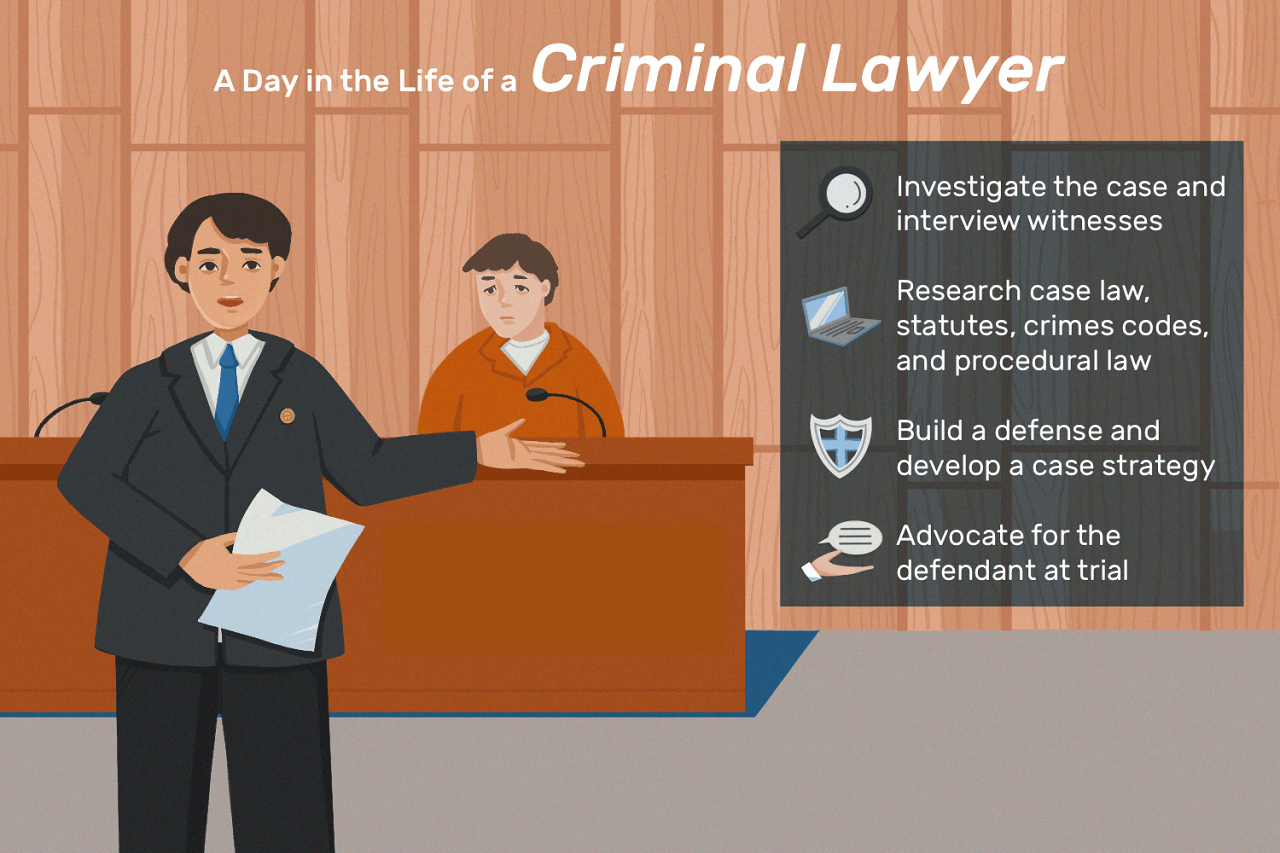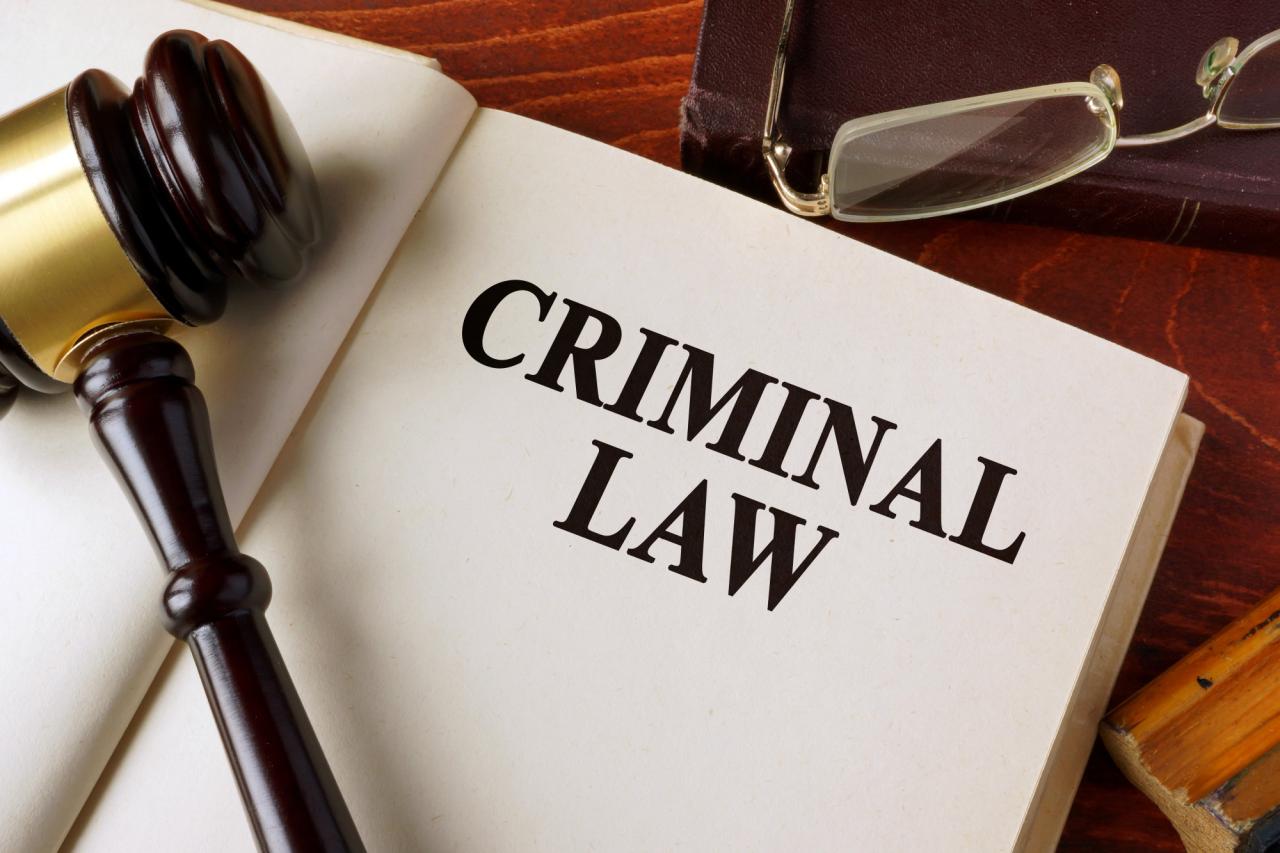
Definition and Scope of Criminal Law
Criminal law is a system of laws that defines criminal offenses and prescribes punishments for those who commit them. The purpose of criminal law is to protect society from harm and to maintain order. Criminal law differs from civil law, which governs disputes between individuals or organizations.
Difference Between Criminal and Civil Law
Criminal cases are brought by the government on behalf of the people, while civil cases are brought by individuals or organizations against other individuals or organizations. Criminal offenses are considered to be more serious than civil wrongs, and the penalties for criminal offenses are typically more severe.
Examples of Criminal Offenses
Some common examples of criminal offenses include:
- Murder
- Robbery
- Assault
- Theft
- Drug possession
Roles and Responsibilities of Criminal Lawyers
Criminal lawyers play a vital role in the criminal justice system, safeguarding the rights of individuals accused of crimes and ensuring fair and impartial proceedings.
Their responsibilities encompass a wide range of duties, including:
Representing Clients in Court
- Representing defendants in criminal trials, hearings, and appeals
- Presenting evidence, examining witnesses, and arguing legal points
- Negotiating plea agreements and sentencing recommendations
Providing Legal Advice and Counsel
- Advising clients on their legal rights and options
- Explaining the criminal justice process and potential penalties
- Preparing clients for trial and other legal proceedings
Ethical Obligations
Criminal lawyers are bound by strict ethical obligations, including:
- Maintaining client confidentiality
- Zealously advocating for their clients within the bounds of the law
- Avoiding conflicts of interest and representing clients competently
Types of Criminal Cases
Criminal cases handled by lawyers encompass a wide spectrum of offenses, ranging from minor misdemeanors to serious felonies. Each type of case presents unique complexities and challenges, requiring specialized knowledge and expertise.
Violent Crimes
Violent crimes involve the use of force or the threat of force against another person. They include:
- Murder
- Assault
- Battery
- Robbery
- Kidnapping
These cases often involve complex evidentiary issues, such as DNA analysis, witness testimony, and the evaluation of mental health. They also require a thorough understanding of self-defense laws and the use of deadly force.
Property Crimes
Property crimes involve the theft or destruction of property. They include:
- Burglary
- Theft
- Arson
- Vandalism
Property crimes can range from minor offenses, such as shoplifting, to major felonies, such as arson. They often involve complex issues related to the value of the property, the intent of the defendant, and the presence of aggravating factors.
Drug Crimes
Drug crimes involve the possession, distribution, or manufacture of controlled substances. They include:
- Possession of drugs
- Trafficking in drugs
- Manufacturing of drugs
Drug crimes can carry severe penalties, especially for repeat offenders. They often involve complex legal issues related to the classification of drugs, the amount of drugs involved, and the intent of the defendant.
White-Collar Crimes
White-collar crimes are non-violent crimes that involve financial fraud or other illegal business practices. They include:
- Embezzlement
- Fraud
- Money laundering
- Insider trading
White-collar crimes can be difficult to investigate and prosecute due to their complex nature. They often involve large amounts of money and sophisticated financial transactions.
Cybercrimes
Cybercrimes are crimes that are committed using computers or the internet. They include:
- Hacking
- Identity theft
- Online fraud
- Cyberbullying
Cybercrimes can have a significant impact on individuals and businesses. They often involve complex legal issues related to jurisdiction, the admissibility of electronic evidence, and the protection of privacy.
Legal Procedures in Criminal Cases
The legal procedures involved in a criminal case are complex and vary depending on the jurisdiction. However, the general流程 Artikeld below provides an overview of the key steps involved, from arrest to sentencing.
Arrest and Initial Appearance
The process begins with the arrest of the suspect by law enforcement officers. The suspect is then taken to a police station for booking and processing. During this process, the suspect is informed of their rights, including the right to remain silent and the right to an attorney.
After booking, the suspect is typically brought before a judge for an initial appearance. At this hearing, the judge will inform the suspect of the charges against them and will set a date for a preliminary hearing.
Preliminary Hearing
The preliminary hearing is a hearing held to determine whether there is probable cause to believe that the suspect committed the crime charged. The prosecution presents evidence to support the charges, and the defense may present evidence to rebut the prosecution’s case.
If the judge finds that there is probable cause, the suspect will be bound over for trial. If the judge does not find probable cause, the charges will be dismissed.
Trial
If the suspect is bound over for trial, the case will proceed to trial. The trial is a hearing held before a judge or jury to determine the guilt or innocence of the suspect.
The prosecution presents evidence to prove that the suspect committed the crime, and the defense presents evidence to rebut the prosecution’s case. The jury then deliberates and reaches a verdict.
Sentencing
If the suspect is found guilty, the judge will sentence the suspect. The sentence may include imprisonment, probation, or a fine.
The role of the lawyer in a criminal case is to represent the suspect and to protect their rights. The lawyer will advise the suspect of their rights, represent them at all hearings and trials, and negotiate with the prosecution on their behalf.
5. Defenses and Strategies

Criminal defense attorneys employ various strategies to protect their clients’ rights and interests. These defenses are based on legal principles and strategic considerations aimed at challenging the prosecution’s case or mitigating the potential consequences.
Common Defenses
Defendants in criminal cases may utilize several common defenses, including:
– Alibi: Establishing that the defendant was not present at the scene of the crime at the time it occurred.
– Self-defense: Arguing that the defendant’s actions were justified to protect themselves or others from imminent harm.
– Insanity: Demonstrating that the defendant lacked the mental capacity to understand the nature and consequences of their actions.
– Entrapment: Asserting that the defendant was induced to commit a crime by law enforcement officials through improper tactics.
– Statute of limitations: Arguing that the prosecution failed to file charges within the legally prescribed time frame.
Each defense has its specific legal basis and strategic considerations. For instance, the insanity defense requires rigorous psychiatric evaluation and evidence to support the claim of mental incapacity. The entrapment defense focuses on proving that law enforcement officers’ conduct was so outrageous that it induced the defendant to commit the crime.
Evidence and Witnesses
Building a strong defense involves effectively utilizing evidence and witnesses. Attorneys may present physical evidence, such as DNA or fingerprints, to challenge the prosecution’s case or support their own theories. They may also call witnesses, including expert witnesses, to provide testimony that supports their client’s defense.
Witnesses can provide firsthand accounts, corroborate the defendant’s alibi, or challenge the credibility of prosecution witnesses. Their testimony can be crucial in swaying the jury or judge in the defendant’s favor.
Sentencing and Appeals
Sentencing and appeals are critical stages in the criminal justice process. Sentencing determines the punishment imposed on a convicted criminal, while appeals provide a mechanism to challenge the conviction or sentence.
Factors Considered in Sentencing
Sentencing decisions are guided by various factors, including:
– Nature and severity of the crime
– Defendant’s criminal history
– Victim impact statements
– Mitigating and aggravating circumstances
– Sentencing guidelines and statutory mandates
Role of the Lawyer in Sentencing
Criminal lawyers play a crucial role in the sentencing process. They:
– Present evidence and arguments to mitigate the sentence
– Negotiate plea agreements that may result in a reduced sentence
– Advise clients on sentencing options and their potential consequences
Appeals Process and Grounds
Appeals allow defendants to challenge their convictions or sentences. Appeals are typically based on:
– Errors of law committed during the trial
– Insufficient evidence to support the conviction
– Violation of the defendant’s constitutional rights
– Excessive or disproportionate sentences
Ethical Considerations

Criminal lawyers face numerous ethical challenges, including the need to balance their clients’ rights with their own professional obligations and the interests of society.
Maintaining client confidentiality is paramount for criminal lawyers. They are obligated to protect their clients’ communications and information, even if it is harmful or incriminating. This is essential for ensuring that clients can fully disclose their actions and receive effective legal representation.
Consequences of Unethical Behavior
Unethical behavior by criminal lawyers can have severe consequences, including disbarment, suspension, or even criminal charges. Lawyers who violate ethical rules may also face civil lawsuits for damages caused to their clients or others.
Resources and Support for Criminal Lawyers

Criminal lawyers often rely on various resources to support their legal practice. These resources include legal research databases, case preparation tools, and client support services.
Continuing Legal Education and Networking
Continuing legal education (CLE) is essential for criminal lawyers to stay up-to-date on the latest legal developments and best practices. CLE courses and conferences provide opportunities for lawyers to learn from experts, share knowledge, and network with colleagues.
Professional Organizations and Support Groups
Several professional organizations and support groups offer resources and support to criminal lawyers. These organizations provide networking opportunities, continuing legal education, and access to specialized resources. Examples include the National Association of Criminal Defense Lawyers (NACDL) and the American Bar Association’s Criminal Justice Section.





